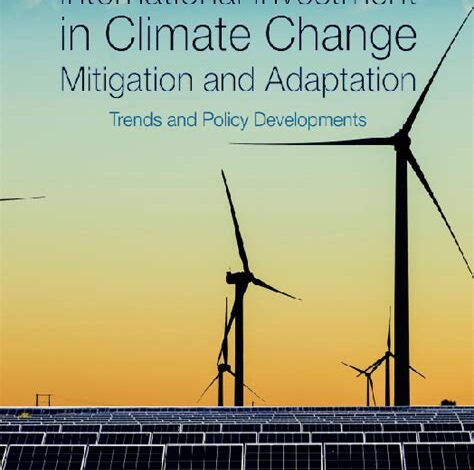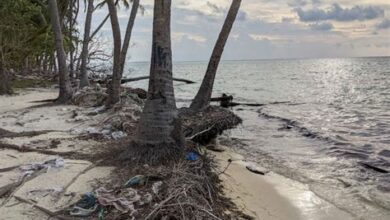Maldives Receives International Aid for Climate Change Mitigation

Discover how international aid is crucial for mitigating climate change in the vulnerable Maldives. Learn about initiatives and future prospects forThe Maldives, an archipelago in the Indian Ocean, is facing the devastating impact of climate change. Rising sea levels, extreme weather events, and coastal erosion threaten the very existence of this low-lying island nation. However, there is a glimmer of hope as the Maldives receives international aid for climate change mitigation. In this blog post, we will explore the importance of international aid in addressing climate change, the vulnerabilities that the Maldives face, and the initiatives being undertaken to mitigate the effects of climate change. Additionally, we will also delve into the impact of international aid on the Maldives and the future prospects for climate resilience in this beautiful but fragile nation. Join us as we take a closer look at how international support is helping the Maldives combat the challenges posed by climate change and pave the way for a more sustainable future.
Importance of International Aid
International aid plays a crucial role in providing assistance to countries that are vulnerable to climate change, such as the Maldives. With the rising sea levels and increasing frequency of natural disasters, the Maldives is facing significant challenges in maintaining its infrastructure and ensuring the safety and well-being of its citizens. The support and aid from other countries and international organizations are essential in helping the Maldives mitigate the impacts of climate change and build resilience.
Furthermore, international aid also allows the Maldives to implement sustainable development projects that prioritize environmental conservation and adaptation to climate change. These projects contribute to the overall efforts of combating climate change on a global scale, as the Maldives serves as a prime example of the urgent need for climate resilience and adaptation measures. Without international aid, the Maldives would struggle to address these challenges effectively and protect its natural resources and cultural heritage.
In essence, international aid is not only vital for the Maldives’ ability to adapt and mitigate the impacts of climate change, but it also reflects the solidarity and responsibility of the global community in addressing environmental crises. The importance of international aid in supporting climate change mitigation efforts cannot be overstated, as it enables vulnerable countries like the Maldives to navigate the challenges posed by climate change and work towards a sustainable and resilient future.
Maldives’ Vulnerability to Climate Change
The Maldives is a nation composed of around 1,200 small islands, making it particularly vulnerable to the effects of climate change. With the majority of the land lying just 1 meter above sea level, rising sea levels pose a significant threat to the country. Additionally, the increasing frequency and intensity of extreme weather events, such as storms and flooding, further exacerbate the Maldives’ vulnerability.
Furthermore, the reliance on the ocean as a source of income through tourism and fishing is another factor that contributes to the vulnerability of the Maldives to climate change. The deterioration of coral reefs and marine life due to ocean acidification and warming temperatures impacts both the economy and the environment of the Maldives.
In response to these challenges, the Maldives has implemented various initiatives for climate change mitigation, such as efforts to reduce carbon emissions, protect marine ecosystems, and promote sustainable tourism practices. However, the impact of international aid is crucial in supporting these efforts, as the Maldives alone may not have the resources to adequately address the multifaceted challenges posed by climate change.
Initiatives for Climate Change Mitigation
One of the key initiatives for climate change mitigation in the Maldives is the development of renewable energy sources. The country has been investing in solar power and wind energy to reduce its dependence on fossil fuels, which contribute to greenhouse gas emissions. By harnessing the power of the sun and wind, the Maldives aims to lower its carbon footprint and decrease its vulnerability to the impacts of climate change.
Another important initiative is the implementation of sustainable waste management practices. The Maldives is working towards reducing its plastic usage and improving waste disposal methods to prevent pollution of its marine and coastal ecosystems. By addressing these issues, the country hopes to protect its natural environment and preserve its biodiversity, which are crucial for climate resilience.
Furthermore, the Maldives is actively engaging in international partnerships and collaborations to address climate change. The country is working with other nations, as well as non-governmental organizations and international agencies, to share knowledge and resources for climate adaptation and mitigation. These initiatives demonstrate the Maldives’ commitment to combating climate change and securing a sustainable future for its people and environment.
Impact of International Aid on Maldives
Impact of International Aid on Maldives
International aid plays a crucial role in supporting countries like the Maldives in addressing the impact of climate change. The Maldives, an island nation located in the Indian Ocean, is particularly vulnerable to the effects of climate change such as rising sea levels, extreme weather events, and coral reef degradation. The support provided through international aid initiatives has been instrumental in helping the Maldives mitigate these challenges and build climate resilience.
One significant impact of international aid on the Maldives is the implementation of projects aimed at adapting to climate change. These projects focus on measures such as building coastal protection structures, implementing sustainable water management practices, and promoting renewable energy sources. The financial and technical assistance from international aid organizations has enabled the Maldives to make significant progress in adapting to the changing climate and reducing the risks posed by natural disasters.
Furthermore, international aid has also played a key role in supporting capacity building and knowledge exchange in the Maldives. Through training programs, workshops, and technical support, the country has been able to enhance its expertise in climate change adaptation and mitigation. This has led to the development of innovative solutions and the adoption of best practices that contribute to the overall resilience of the Maldives in the face of climate-related challenges.
Future Prospects for Climate Resilience
Future Prospects for Climate Resilience
The Maldives, as a low-lying island nation, is particularly vulnerable to the impacts of climate change. Rising sea levels, increased frequency of extreme weather events, and ocean acidification are just some of the challenges that the Maldives faces. In order to address these issues and build resilience to climate change, the Maldives has been the recipient of international aid focused on climate change mitigation and adaptation.
One of the key prospects for climate resilience in the Maldives is the implementation of sustainable infrastructure and technologies. This includes the development of renewable energy sources such as solar power and wind energy, as well as the use of innovative building materials and techniques that can withstand the impacts of climate change. By investing in resilient infrastructure, the Maldives can better prepare for and adapt to the changing climate, reducing the risk of damage to homes, businesses, and critical infrastructure.
In addition to physical infrastructure, future prospects for climate resilience in the Maldives also involve capacity building and knowledge sharing. This includes investing in the education and training of local communities, government officials, and key stakeholders on climate change adaptation strategies and best practices. By empowering individuals and communities with the knowledge and skills to adapt to climate change, the Maldives can build a more resilient and sustainable future.





